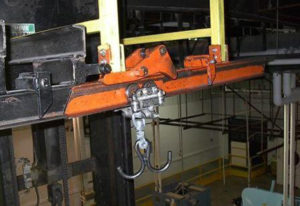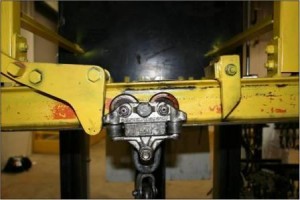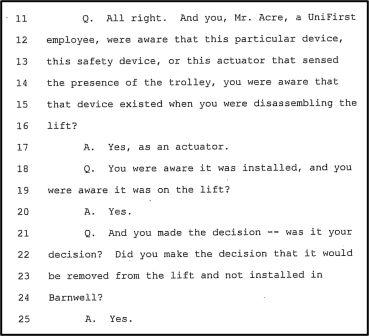

Disclaimer: Any results that the firm may have achieved on behalf of its clients in other matters does not necessarily indicate similar results can be obtained for you. These settlement and verdicts are for general information only.
The Laundry Lift Case
The case was about a young man who was catastrophically injured and paralyzed when his neck was broken after being hit on the head by a 200 pound bag of laundry, which fell 15 feet from a lifting device. The laundry bag fell from the lift due to improper installation of the lift. The lift was designed and sold by the manufacturer to a third party with a specific safety device in place that would prevent the laundry bag from falling. The lift was purchased from this third party and installed at our client’s workplace, but the safety device was not installed. Consequently, our client was injured; he became a paraplegic and survived 3 years before he died.
The way the lift operated was for the laundry bags on the floor to be hooked to a hoist and then raised up to meet with another rail that would take the bags away on their course. Once the hoist made the connection with the top rail, a trolley – which held the hooks and laundry bags – would slide forward onto the top rail, or takeaway rail. The hoist would then be lowered to the ground to start again.

 In the picture to the left, you can see the orange hoist and the trolley, which is the metal piece attached to the rail with the hooks suspended beneath. The photo shows the hoist in a raised position, aligned with the takeaway rail to the left. The hoist and takeaway rail come together so that the trolley, with its attached laundry bag suspended from the hooks, can move from the hoist onto the takeaway rail. Once the trolley and bag have passed completely onto the takeaway rail and have passed a safety interlock, the hoist can be lowered to the floor. To the right is a close up image of the trolley.
In the picture to the left, you can see the orange hoist and the trolley, which is the metal piece attached to the rail with the hooks suspended beneath. The photo shows the hoist in a raised position, aligned with the takeaway rail to the left. The hoist and takeaway rail come together so that the trolley, with its attached laundry bag suspended from the hooks, can move from the hoist onto the takeaway rail. Once the trolley and bag have passed completely onto the takeaway rail and have passed a safety interlock, the hoist can be lowered to the floor. To the right is a close up image of the trolley.
When this equipment was installed at our client’s workplace, it was installed without the manufacturer’s safety device in place. Additionally, the worker was required to push a button to manually raise the hoist while standing directly underneath each bag of laundry weighing up to 500 pounds.
We filed a products liability suit against the parent company of our client’s employer. The evidence showed that the parent company purchased and installed the machine in the plant without the existing safety device, and was therefore responsible for neglecting to guard against a hazard for which a safety device existed.

This case became a battle over who was the statutory employer, with the parent company claiming they were one and the same corporation as the employer of our client. UniFirst was identified as the parent company that we filed suit against. UniTech was the wholly owned subsidiary of UniFirst. UniTech was our client’s employer. UniTech hired, trained, issued pay checks and W-2’s to our client. UniTech incurred the costs of this on–the-job injury through worker’s compensation insurance. Once named in this legal action, UniFirst proceeded to argue before the court that UniFirst and UniTech were really the same corporation, and therefore UniFirst was the statutory employer of our client and that our claim against them must be excluded.
We discovered that UniFirst had taken great measures to separate itself entirely and absolutely from UniTech. While UniFirst owned UniTech, the two did not do business in the same markets, with UniTech being focused solely on a specialized market that UniFirst actively and purposefully stayed out of. The two companies maintained separate corporate identities; they were separately incorporated; they maintained separate boards of directors; and they had separate tax ID numbers and separate corporate bylaws.
UniFirst filed a Motion to Dismiss based on this issue of statutory employer, and after both sides argued before the court, the judge denied UniFirst’s motion, deciding in favor of our client. This was a great success for our client.
After winning the argument over statutory employment, we went on to reach a favorable resolution in this case on behalf of the family.
Personal Injury Lawyers 1330 Laurel Street Columbia, SC 29201 Phone: 803-256-4242
Mailing Address
Post Office Box 1476
Columbia, South Carolina 29202
Fax: (803) 256-1952
Copyright © 2023 John D. Kassel, Attorney at Law, LLC. All rights reserved. Privacy Policy I Terms of Service | Disclaimer
This website is designed for general information only. The information should not be construed to constitute formal legal advice or the formation of a lawyer/client relationship. The results and testimonials listed on this website are specific to the facts and legal circumstances of specific cases and should not be used to form an expectation that the same results could be obtained for other clients in similar matters. This list is not a description or characterization of the quality of the firm's representation, it is not intended to compare one attorney's work to another and is in no way a guarantee of a specific result for your case.

